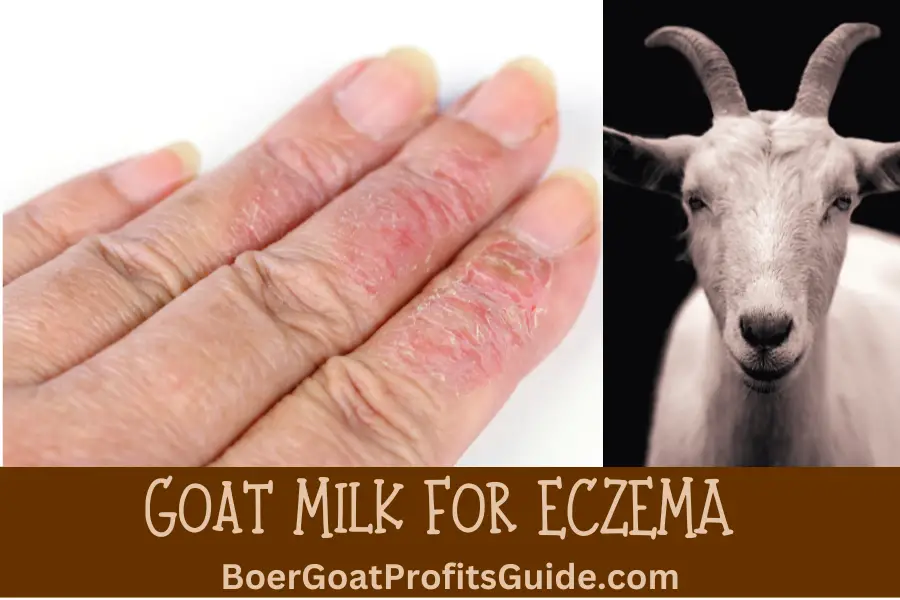
Eczema, a common skin condition characterized by inflammation, itchiness, and red, scaly patches, affects millions worldwide. Numerous treatments and remedies have been suggested to provide relief from eczema symptoms, and one such remedy that has been attracting attention is goat’s milk. As a natural product, goat’s milk has been heralded as a potential remedy for eczema due to its unique properties.
Goat’s milk is rich in nutrients and gentle on the skin, making it a popular alternative to cow’s milk for those with sensitivities or looking for alternative remedies. It’s believed that consuming goat’s milk or using goat’s milk-based products, such as soaps and creams, on the skin might provide relief from eczema symptoms. However, research is inconclusive, and experts are still unsure about the benefits and risks of using goat’s milk to treat eczema.
Table of contents
Key Takeaways
- Goat’s milk is an alternative remedy for eczema due to its unique properties.
- Consuming goat’s milk or using goat’s milk-based products might provide relief from symptoms.
- Research about the effectiveness of goat’s milk for eczema treatment is still inconclusive.
Goat’s Milk and Eczema
Cause and Symptoms of Eczema
Eczema, also known as atopic dermatitis, is a common skin condition that causes inflammation, itching, and redness. It can be triggered by various factors, including allergens, irritants, and stress. Symptoms may vary from person to person, but often include dry, itchy patches of skin that may become red and swollen when scratched.
Goat’s Milk Benefits for Skin
Goat’s milk is rich in vitamins, minerals, and proteins, which can have potential benefits for people with eczema. It contains:
- Vitamin A: Important for skin repair and maintenance
- Vitamin B: Helps retain moisture and soothe irritated skin
- Vitamin C: Supports collagen production and skin health
- Vitamin E: Provides antioxidant protection and promotes skin healing
- Minerals: Essential for skin health, including zinc, selenium, and magnesium
- Fatty acids: Contribute to skin hydration and help reduce inflammation
Using goat’s milk-based moisturizers or soaps may help alleviate eczema symptoms by providing essential nutrients to the skin and alleviating dryness and itching.
Difference Between Goat’s Milk and Cow’s Milk
Goat’s milk is often considered to be a better option for people with eczema due to its lower allergenic profile compared to cow’s milk. The key differences include:
- Protein structure: Goat’s milk proteins are smaller in size and have a different structure, making them less likely to cause an allergic reaction.
- Easier digestion: Research suggests that goat’s milk is easier to digest than cow’s milk, possibly due to the differences in protein and fat composition.
- Lower lactose content: Goat’s milk contains slightly less lactose than cow’s milk, which may contribute to fewer allergic reactions.
While goat’s milk can be consumed as a dietary alternative or applied topically in the form of soaps and moisturizers, it is important to remember that individual results may vary, and consulting with a healthcare professional or dermatologist is recommended before making changes to your skincare routine or diet.
Goat Milk Products for Eczema

Goat Milk Soap
Goat milk soap is a popular choice for people with eczema due to its gentle and nourishing properties. It has a similar pH to human skin, making it less irritating for sensitive skin. The soap contains oesthetic fatty acids and vitamins that help moisturize and nourish the skin. Moreover, goat milk soap has natural antibacterial, antifungal, and antiviral properties that may help reduce inflammation and prevent infection.
- Unscented Goat Milk Soap: For those with highly sensitive skin, choosing an unscented and fragrance-free goat milk soap is the best option. This type of soap is gentle enough for babies and children.
- Tea Tree Goat Milk Soap: A variant that combines the benefits of goat milk soap with the antifungal and antiviral properties of tea tree essential oil.

Goat Milk Cream
Goat milk cream and lotions are also helpful in managing eczema symptoms. These creams contain moisturizing and nourishing ingredients like olive oil and essential fatty acids that soothe and protect the skin. Using a goat milk cream can help to alleviate itching, redness, and inflammation caused by eczema.
Note: Always patch test a new product on a small area of the skin to ensure there are no adverse reactions before using it consistently.
Other Goat Milk Skincare Products
In addition to soaps and creams, there are other goat milk skincare products available that may help with eczema symptoms. These include:
- Goat Milk body butter: Made from goat milk, these moisturizers provide nourishment and hydration to dry, irritated skin.
- Goat Milk Lactic Acid Exfoliants: Enriched with natural lactic acid, these exfoliants gently remove dead skin cells and promote healthy skin cell turnover.
- Goat Milk Baths – bathing in goat milk can sometimes provide relief to itchy skin
When searching for goat milk products, look for those that contain natural ingredients and are free of harsh chemicals, fragrances, and artificial colors. This will ensure the best results for those with eczema-prone skin.
Eczema Treatment with Goat Milk
Adults and Eczema Treatment
Goat’s milk can be considered as an alternative food source for adults who suffer from eczema. It has some nutritional benefits that may help in alleviating eczema symptoms. For instance, goat’s milk is rich in calcium, iron, and zinc, which are essential minerals for maintaining healthy skin.
Moreover, goat’s milk has anti-inflammatory properties that may help in reducing the inflammation associated with eczema. Consuming goat’s milk products such as yogurt and kefir can provide additional benefits, as they contain probiotics. Probiotics are known to play a crucial role in balancing the gut and skin microbiome, which may contribute towards eczema treatment.
It is important to note that allergic reactions to goat’s milk can still occur, so it is advised to consult a healthcare professional before incorporating goat’s milk into your diet if you have a known dairy allergy.
Children and Eczema Treatment
For children with eczema, using goat’s milk products like soap or lotion can be a suitable alternative to cow’s milk-based products. Goat’s milk is generally considered to be gentler on their sensitive skin, thanks to its anti-inflammatory properties and lower protein allergens.
Incorporating goat’s milk into a child’s diet may also support their gut health and immune system, which can potentially help with eczema symptoms. However, it is essential to consult a pediatrician before making any significant changes to a child’s diet, especially if they have a known dairy allergy.
To further enhance the benefits of goat’s milk products for eczema treatment, combining it with ingredients like olive oil can help in moisturizing the skin and potentially improve the skin’s overall condition.
Lifestyle and Eczema Management
Managing Triggers and Irritants
Eczema flare-ups can be triggered by various factors, including stress, pollution, and certain beauty products. It is essential to identify these triggers to better manage your symptoms. Some ways to minimize exposure to irritants and manage eczema include:
- Stress reduction: Implement stress-management techniques, such as meditation, exercise, or engaging in hobbies, to help keep eczema symptoms at bay.
- Choose gentle products: Opt for fragrance-free, hypoallergenic cosmetic and beauty products specifically designed for sensitive skin.
- Avoid pollution: Protect your skin from environmental pollution by wearing protective clothing and regularly cleansing your skin to remove irritants.
Role of Nutrition and Supplements
While a healthy diet might not directly cure eczema, it can have a substantial impact on your immune system and overall health, which can subsequently reduce eczema symptoms. Consider the following aspects of nutrition and supplements for eczema management:
- Food allergies: Some individuals experience eczema flare-ups due to certain food allergies. Common allergens include dairy, gluten, and eggs. Tracking your diet and symptoms can help identify potential food triggers.
- Nutrients for skin health: Incorporating nutrient-rich foods containing vitamins and minerals like vitamin D, vitamin C, and vitamin E into your diet can support skin health and possibly provide some relief from eczema symptoms.
- Goat’s milk: Research has shown that goat’s milk contains essential nutrients, such as lactic acid and probiotics, that can benefit skin health. Although there is not enough evidence to explicitly support the use of goat’s milk for eczema, some people find relief by incorporating it into their skincare routine or diet.
Goat Milk Eczema Video
This excellent video shows how goat milk can make eczema worse.
Frequently Asked Questions
There is currently no definitive evidence to prove that goat milk lotion directly helps in treating eczema. However, goat milk products are known to be gentle and have moisturizing properties, which may be beneficial for people with sensitive skin or eczema.
For individuals with eczema, choosing a mild, fragrance-free soap is usually recommended. Goat milk soap is known for being gentle and nourishing for the skin, although there’s no concrete evidence that it specifically treats eczema. As it may vary from person to person, it’s essential to test different soaps and choose the one that works best for you.
Goat milk has soothing and moisturizing properties, which might help reduce itching caused by dry and irritated skin. However, there’s no concrete evidence that goat milk directly alleviates itching caused by eczema or other skin conditions.
Yes, goat milk soap has various benefits for the skin. It contains naturally occurring vitamins, minerals, and fatty acids, which may help nourish and moisturize your skin. It can also be an excellent option for those with sensitive skin or mild skin conditions due to its gentle nature.
Goat milk soap may provide some relief for individuals with psoriasis, as it has soothing and moisturizing properties. However, the effectiveness may vary depending on the severity of the condition and each person’s skin. It’s essential to consult a dermatologist or healthcare professional for tailored advice and treatment recommendations.
Goat milk products are generally gentle and contain natural ingredients, which may be less likely to cause breakouts. However, everybody’s skin reacts differently to various products, so it is essential to monitor and adjust your skincare routine accordingly. If you experience worsening acne after using goat milk products, consult a dermatologist or healthcare professional for guidance.




